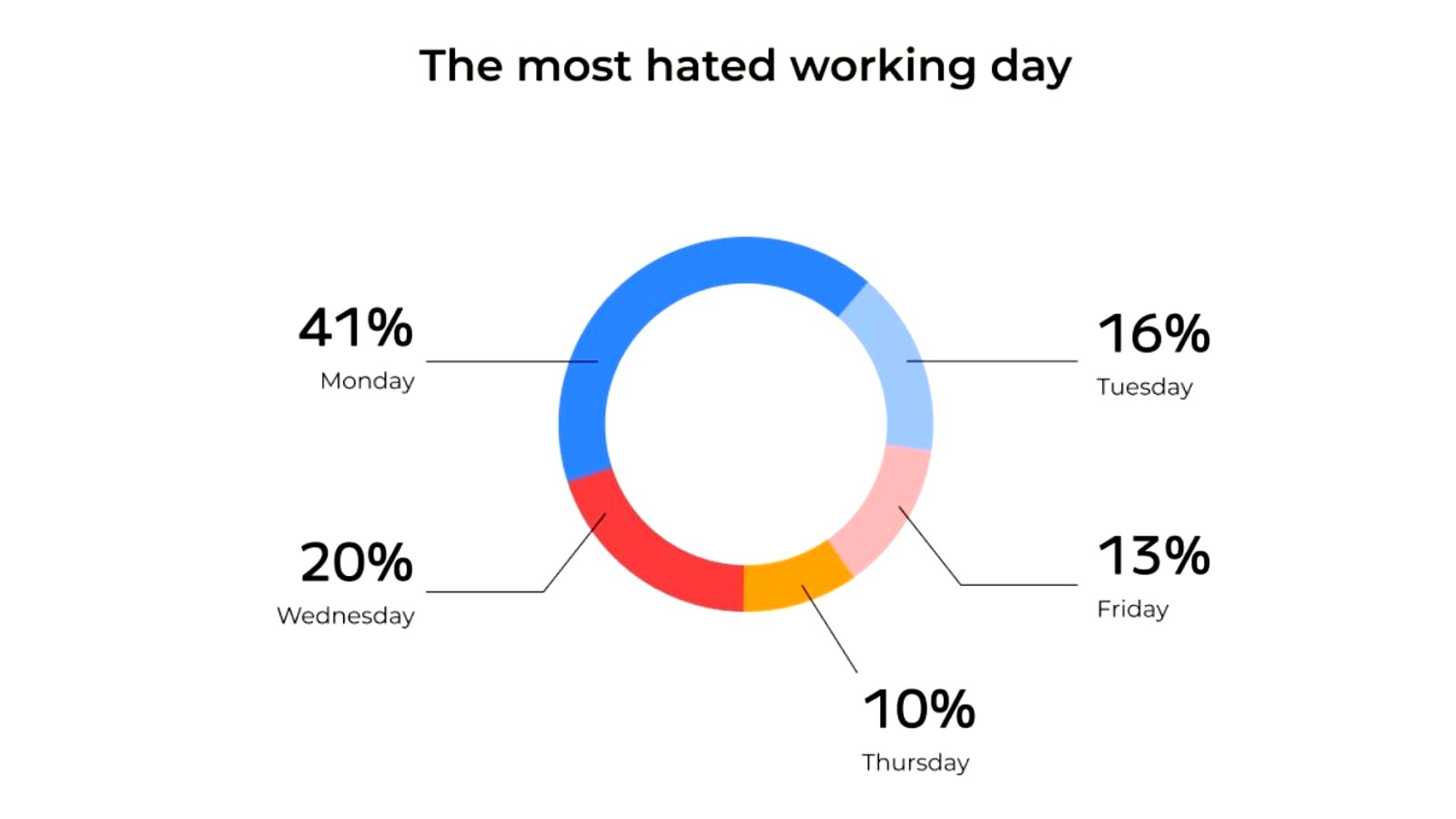share on
Monday-related stress is often because of a high-pressure work environment, which keeps employees at full speed, and a heavy workload that often extends to the following days.
It is no surprise that 41% of employees surveyed indicated Monday as the day in the working week they dislike the most.
While the disdain for the start of another workweek has been long established, a study by Zety revealed that younger employees disliked Mondays the most (56%) — employees 25 years or younger indicated as such, compared to 45% of those aged 26–40, and 34% of those who are 41 years or older.
Looking at the rest of the week, Wednesday was ranked the second most disliked day, earning 20% of the response. This was followed by:
- Tuesday in third, acquiring 16% of indications,
- Friday in fourth, cited by 13%, and
- Thursday as the least disliked day, at 10% of the votes.
So, it may not have been a groundbreaking revelation that Mondays are generally dreaded by employees, but it's worth exploring the cause of this pervasive sentiment. Respondents were asked to give reasons for choosing a specific day as the most disliked. The top reasons for this include having the heaviest workload in the whole week, having a lot of meetings that day, feeling least motivated and unproductive, or having a report meeting with their boss.
In line with Mondays being generally the most disliked days amongst the employees surveyed, eight in 10 of the total respondents (80%) believe it was the most stressful day of the workweek.
The study identified the top ten factors of Monday-related stress:
- High-pressure work environment, which keeps employees at full speed
- The heavy workload that awaits on Monday and often extends to the following days
- Expecting to work overtime
- Work bullying, discrimination, or unequal treatment are still present in the workplace
- Physical demands of the job make it harder
- The thought of having to work for the next five days
- Long and exhausting commuting
- Overall job dissatisfaction due to low salary and no benefits
- Lack of support from bosses, managers, or coworkers
- Poor relationships with coworkers or supervisors
These issues are so pertinent that the majority of the respondents (54%) experience the 'Sunday scaries' —.this refers to negative feelings that some people have at the end of the weekend as returning to the work or school routine can make people feel down and increases stress.
- 54% said they experience it sometimes,
- 20% said it’s rare,
- 10% believe it happens often,
- 8% experience 'Sunday scaries' every week,
- 8% claimed it never happened.
On a more positive note, employees also had a favourite day of the week. Paradoxically, most of the respondents pointed to Monday as their favourite working day, with 25% of the votes. Wednesday was the runner-up (24%), followed by Friday (23%). Conversely, just 6% of the respondents cited Thursday as their favourite day.
Looking at productivity, the survey indicated Wednesday as the most productive day across the week, as 33% of respondents believe this is the day on which they manage to complete the most tasks; followed by Monday (22%). When asked the opposite, most employees indicated Friday as their most unproductive day (22%).
Regardless, it may be hard to maintain a constant level of productivity. In fact, more than nine in 10 respondents (95%) experience fluctuating productivity levels across the workweek.
Motivation before vacation
The above can be said for our usual workweek, but what about special days such as vacations, holidays, and other planned absences from work?
Per the study, 62% feel more motivated to work before the festive season and other holidays. At the same time, 50% are more motivated to work after coming back from the festive season and other holidays.
In terms of long breaks, 52% believe they are also more motivated before such breaks. A little less (48%) admit they are more motivated after returning from long breaks.
Interestingly, birthdays are not an obstacle either — 60% of respondents feel more motivated to work on their birthdays.
Could a shorter workweek help?
With employees having a particular day they dislike the most, and fluctuating productivity, is a shorter working week the solution?
As a basis, 53% of respondents agree that 40 working hours per week it’s not enough to get things done at work.
Going off this, more than eight in 10 respondents (85%) support the idea of a four-day workweek. In tandem, eight in 10 respondents (81%) believe a four-day workweek would increase their productivity and motivation. This is under the assumption that the four-day workweek would operate under the reduced 40 hours weekly, the study highlighted. Given a choice, 64% of respondents chose a five-day, 40-hour week over a four-day, 40-hour week.
Looking at schedules, the most tempting for the employees is the option to work seven hours throughout the five days, earning 35% of the votes. This was followed by:
- Five working days, eight hours each (40 hours) – 27%
- Four working days, eight hours each (32 hours) – 18%
- Four working days, 10 hours each (40 hours) – 5%
According to the study, one hour less per day will allow handling all professional duties while increasing productivity and providing a better work-life balance.
As a whole, eight in 10 agree, working six or seven instead of eight hours daily would increase their commitment and motivation to work.
ALSO READ: 61% of employees surveyed in Hong Kong, and 58% in Singapore say they are vacation-deprived
Thank you for reading our story! If you have any feedback, feel free to let us know — take our 2023 Readers' Survey here.
Lead image / The Truth about Mondays: 2023 Work Week Research
share on


